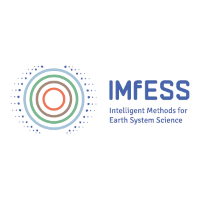KPA-Kolloquium
Nächstes Kolloquium am 24. Juli 2025
| Titel: | "Evaluating regional model biases in the European Arctic using paired stable water isotope observations" |
| Vortragender: | Prof. Harald Sodemann (Meteorology (Numerical Modelling, Atmospheric Water Cycle), University of Bergen, Norway) |
| Termin: | 24. Juli 2025, 14:00 Uhr |
| Ort: | Hörsaal 4.001, Pohligstr. 3, Köln, Institut für Geophysik und Meteorologie |
| Zoom-Link: | Für die Online-Teilnahme wenden Sie sich bitte an katja.sperveslage@uni-koeln.de. |
| Organisation: | KPA , CESOC |
| Beschreibung: | Svalbard is located within the major entry pathway of relatively warm, mid-latitude air masses into the polar region. The stable water isotope composition in atmospheric water vapour and precipitation is a sensitive indicator of the accumulated condensation history of air masses on their way into the Arctic. The progressive loss of heavy isotopes with precipitation results in the well-known latitude gradient of stable isotopes in precipitation. Here we evaluate how well a simulation with the isotope-enabled regional model COSMO-iso driven by ECHAM6 nudged to ERA5 reanalyses represents the increasing depletion with higher latitude measurement location. We thereby make use of a data set of time-resolved precipitation and vapour isotope measurements collected during the ISLAS campaigns from 2020 to 2022 using research aircraft and station measurements from Ny-Ålesund, Longyearbyen, Tromsø, Andøya, Bergen, and Finse, all located along the European entry pathway for mid-latitude air masses into the Arctic. Results show that the time variations are well represented at all three measurements sites. While the sub-Arctic and the mid-latitude sites show a small low-bias in the simulated isotope depletion for δ18O and δD in precipitation, the indicator for non-equilibrium fractionation d-excess shows a high bias of more than 10 permil. Comparison with measurements taken on Svalbard during the ISLAS campaigns show a substantial increase in scatter with no consistent bias for δ18O and δD, whereas the d-excess has a consistent low bias. Vapour measurements confirm the results the from precipitation comparison. An investigation of the thermodynamic environment within and below clouds from in-situ and remote sensing observations points to an important role of the saturation adjustment in the microphysics scheme that prevents highly ice super-saturated environments in clouds that are conducive to low values of the d-excess. The operational model AROME-Arctic allows for more wide-spread regions of ice super-saturation, but does currently not include water isotopes. We conclude that paired precipitation-vapour water isotope measurements are a valuable diagnostic for model evaluation for mixed-phase cloud microphysics in the Arctic. |
Im Rahmen des KPA-Kolloquium werden in unregelmäßigen Abständen Vorträge zum weiten Themenbereichs der Erdsystemwissenschaften präsentiert. Diese werden für nicht nur für Geowissenschaftler, sondern auch für fachfremde, am Thema interessierte Personen angeboten.
Die Vorträge finden zu unterschiedlichen Zeiten immer in Präsenz statt, teilweise als Hybrid-Veranstaltung.
Der Ort ist entweder der Geo-/Bio-Hörsaal in der Zülpicher Str. 49a, Gebäude 310c oder der Hörsaal 4.001 in der Pohligstr.3, Gebäude 410 (Eingang: Höninger Weg 100, 4. Stock).
Der Termin unseres ersten Kolloquiums war der 4. Juli 2023 (siehe unten).
